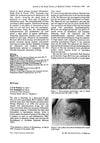March 2023 in “Anais Brasileiros De Dermatologia” Topical minoxidil is the best-supported treatment for female hair loss, but personalized plans are needed.
2 citations,
July 2022 in “Frontiers in Medicine” Combining minoxidil with microneedling or spironolactone is more effective for female hair loss than using minoxidil alone.
[object Object] 1 citations,
September 2021 in “Frontiers in Endocrinology” Minoxidil can help transgender males grow facial hair before starting testosterone therapy.
 3 citations,
January 2016 in “Annals of Dermatology”
3 citations,
January 2016 in “Annals of Dermatology” Minoxidil was the most effective treatment for hair regrowth in rats compared to Aminexil or Kerium.
 213 citations,
June 2017 in “Rheumatology”
213 citations,
June 2017 in “Rheumatology” The guidelines suggest a detailed approach to diagnosing and treating lupus, with a focus on regular check-ups, personalized medicine, and a range of drug options for different cases.
 179 citations,
March 2005 in “British Journal of Dermatology”
179 citations,
March 2005 in “British Journal of Dermatology” Oral antiandrogens effectively treat female hair loss, with better results in higher hair loss grades.
 November 2023 in “Skin appendage disorders”
November 2023 in “Skin appendage disorders” Public interest in oral minoxidil for hair loss increased after a New York Times article.
 14 citations,
January 2008 in “Dermatology Online Journal”
14 citations,
January 2008 in “Dermatology Online Journal” Hormonal therapies like cyproterone acetate and spironolactone may help some women with hair loss, but finasteride 1mg is not useful, and the effectiveness of other treatments is still unclear.
 November 2023 in “Frontiers in Neuroendocrinology”
November 2023 in “Frontiers in Neuroendocrinology” Some people experience lasting sexual, psychological, and sleep problems after using finasteride or SSRI antidepressants, possibly due to similar underlying causes.
 January 2008 in “Dermatology Online Journal”
January 2008 in “Dermatology Online Journal” Hormonal therapy like cyproterone acetate and spironolactone may help female hair loss, but more research is needed, especially for pre-menopausal women.
 21 citations,
January 2022 in “Pharmaceutics”
21 citations,
January 2022 in “Pharmaceutics” Colchicine might help treat different skin diseases, but more research is needed to confirm its effectiveness and safe dosage.
 42 citations,
July 2021 in “Frontiers in Medicine”
42 citations,
July 2021 in “Frontiers in Medicine” Proxalutamide significantly lowered hospital admissions for male COVID-19 patients compared to a placebo.
 18 citations,
December 2010 in “Journal of Trace Elements in Medicine and Biology”
18 citations,
December 2010 in “Journal of Trace Elements in Medicine and Biology” Women with AGA have more androstenedione and dihydrotestosterone, less copper and zinc; copper imbalance affects AGA; treatment improves hormones and minerals.
 October 2018 in “International journal of clinical & experimental dermatology”
October 2018 in “International journal of clinical & experimental dermatology” Baicapil was effective in reducing hair loss and increasing hair growth in women with telogen effluvium.
 15 citations,
September 2013 in “Pharmaceutical Biology”
15 citations,
September 2013 in “Pharmaceutical Biology” Jujube fruit extract may reduce kidney damage from ibuprofen in rats.
 7 citations,
January 2015 in “Biological & Pharmaceutical Bulletin”
7 citations,
January 2015 in “Biological & Pharmaceutical Bulletin” Rice Bran Supercritical CO2 Extract significantly increased hair density and diameter in male alopecia patients without any side effects.
 34 citations,
July 2011 in “Journal of Dermatological Treatment”
34 citations,
July 2011 in “Journal of Dermatological Treatment” Curcuma aeruginosa extract combined with minoxidil effectively treats male-pattern baldness.
 2 citations,
December 2017 in “Bangladesh Journal of Pharmacology”
2 citations,
December 2017 in “Bangladesh Journal of Pharmacology” Black seed oil significantly protects against hair loss from chemotherapy.
 2 citations,
February 1981 in “Journal of the Royal Society of Medicine”
2 citations,
February 1981 in “Journal of the Royal Society of Medicine” A three-year-old girl survived a rare serious infection caused by BCG vaccination, which improved after treatment with a leprosy drug.
 15 citations,
November 2017 in “Drug Delivery and Translational Research”
15 citations,
November 2017 in “Drug Delivery and Translational Research” Certain extracts from Curcuma aeruginosa Roxb. and germacrone can boost the skin's absorption of minoxidil, a hair growth promoter, making it more effective.
 3 citations,
February 2008 in “Basic and clinical dermatology”
3 citations,
February 2008 in “Basic and clinical dermatology” Telogen Effluvium is a hair loss condition where treatment involves identifying and managing its triggers.

Eclipta alba L. (Urang-Aring) can help treat hair loss.

Bee pollen, green tea, essential oils, and various plant extracts improve skin and hair health.
 7 citations,
October 2020 in “Dermatology practical & conceptual”
7 citations,
October 2020 in “Dermatology practical & conceptual” Some skin, hair, and nail supplements can be toxic, interact with medications, affect lab tests, and may increase cancer risk.
[object Object]  October 2024 in “A I Burnasyan Federal Medical Biophysical Center Clinical Bulletin”
October 2024 in “A I Burnasyan Federal Medical Biophysical Center Clinical Bulletin” Various treatments effectively manage androgenetic alopecia.
December 2022 in “Archives of Dermatological Research” Adding cetirizine to minoxidil improves hair growth and thickness in women with androgenetic alopecia.
 207 citations,
April 2006 in “Journal of The American Academy of Dermatology”
207 citations,
April 2006 in “Journal of The American Academy of Dermatology” Iron deficiency may be related to hair loss, but there's not enough evidence to recommend iron screening or supplements for all hair loss patients.
 38 citations,
June 2005 in “Contact Dermatitis”
38 citations,
June 2005 in “Contact Dermatitis” Patient had scalp allergy from minoxidil; test helped identify cause and suggest alternative treatments.
 April 2016 in “Journal of The American Academy of Dermatology”
April 2016 in “Journal of The American Academy of Dermatology” Some blood pressure medications are linked to a higher risk of skin cancer.
 April 2016 in “Journal of The American Academy of Dermatology”
April 2016 in “Journal of The American Academy of Dermatology” Finasteride and SSRIs together increase impotence and low libido risk in men.

























